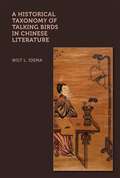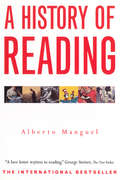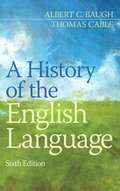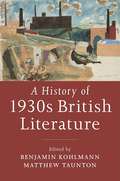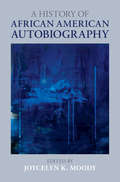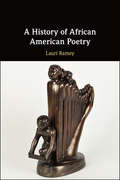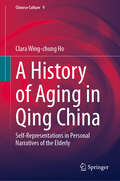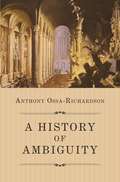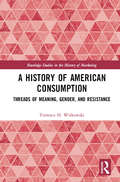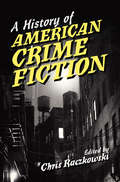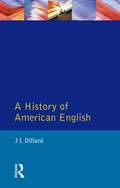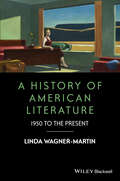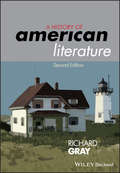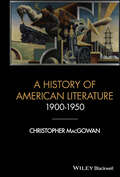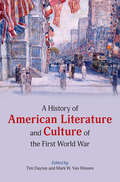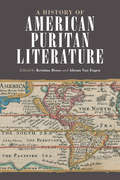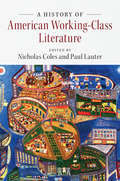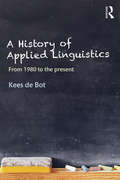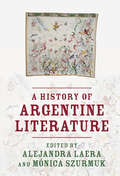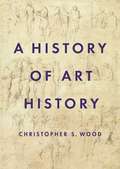- Table View
- List View
A Historical Taxonomy of Talking Birds in Chinese Literature (Harvard-Yenching Institute Monograph Series)
by Wilt L. IdemaParrots and mynahs have played a unique role in Chinese literature for two millennia. These birds that can talk and interact intelligently with their owners were treasured as pets both in the palace and in private homes. The caged birds were pitied for their homesickness but praised for their eagerness to serve. Over time they developed into exemplars of Confucian values such as filial piety and loyalty, and they also featured prominently in tales of love and war. Closely associated with Buddhism from early on, the parrot proved itself an effective preacher of the Dharma and became the favorite bird of the bodhisattva Guanyin. In this wide-ranging thematic study Wilt L. Idema traces the development of the parrot and the mynah as characters in many forms of poetry and prose of Chinese elite literature, as well as in the long narrative ballads of traditional popular literature. The book provides complete renditions of Mi Heng’s (173–198) Rhapsody on the Parrot, the anonymous Tale of the Parrot’s Filial Piety of the fifteenth century, and the anonymous Precious Scroll of the Parrot of late-imperial times. An epilogue discusses the disappearance of the parrot in modern Chinese literature.
A Historiography of the Modern Social Sciences
by Roger E. Backhouse Philippe FontaineA Historiography of the Modern Social Sciences includes essays on the ways in which the histories of psychology, anthropology, sociology, economics, history and political science have been written since the Second World War. Bringing together chapters written by the leading historians of each discipline, the book establishes significant parallels and contrasts and makes the case for a comparative interdisciplinary historiography. This comparative approach helps explain historiographical developments on the basis of factors specific to individual disciplines and the social, political, and intellectual developments that go beyond individual disciplines. All historians, including historians of the different social sciences, encounter literatures with which they are not familiar. This book will provide a broader understanding of the different ways in which the history of the social sciences, and by extension intellectual history, is written.
A History Of Reading
by Alberto ManguelFrom clay tablets to CD-ROM, from book thieves to book burners, bibliophiles, book fools and saints, noted essayist Alberto Manguel follows the quirky and passionate 4,000-year-old history of the written work whose true hero is the reader. Photos & line drawings.
A History Of The English Language
by Thomas Cable Albert BaughComprehensive and balanced, this classic exploration of the history of the English language combines internal linguistic history and external cultural history—from the Middle Ages to the present. Students are encouraged to develop both an understanding of present-day English and an enlightened attitude toward questions affecting the language today.
A History of 1930s British Literature
by Benjamin Kohlmann Matthew TauntonThis History offers a new and comprehensive picture of 1930s British literature. The '30s have often been cast as a literary-historical anomaly, either as a 'low, dishonest decade', a doomed experiment in combining art and politics, or as a 'late modernist' afterthought to the intense period of artistic experimentation in the 1920s. By contrast, the contributors to this volume explore the contours of a 'long 1930s' by repositioning the decade and its characteristic concerns at the heart of twentieth-century literary history. This book expands the range of writers covered, moving beyond a narrow focus on towering canonical figures to draw in a more diverse cast of characters, in terms of race, gender, class, and forms of artistic expression. The book's four sections emphasize the decade's characteristic geographical and sexual identities; the new media landscapes and institutional settings its writers operated in; questions of commitment and autonomy; and British writing's international entanglements.
A History of African American Autobiography
by Joycelyn MoodyThis History explores innovations in African American autobiography since its inception, examining the literary and cultural history of Black self-representation amid life writing studies. By analyzing the different forms of autobiography, including pictorial and personal essays, editorials, oral histories, testimonials, diaries, personal and open letters, and even poetry performance media of autobiographies, this book extends the definition of African American autobiography, revealing how people of African descent have created and defined the Black self in diverse print cultures and literary genres since their arrival in the Americas. It illustrates ways African Americans use life writing and autobiography to address personal and collective Black experiences of identity, family, memory, fulfillment, racism and white supremacy. Individual chapters examine scrapbooks as a source of self-documentation, African American autobiography for children, readings of African American persona poems, mixed-race life writing after the Civil Rights Movement, and autobiographies by African American LGBTQ writers.
A History of African American Poetry
by Lauri RameyAfrican American poetry is as old as America itself, yet this touchstone of American identity is often overlooked. In this critical history of African American poetry, from its origins in the transatlantic slave trade, to present day hip-hop, Lauri Ramey traces African American poetry from slave songs to today's award-winning poets. Covering a wide range of styles and forms, canonical figures like Phillis Wheatley (1753–1784) and Paul Laurence Dunbar (1872–1906) are brought side by side with lesser known poets who explored diverse paths of bold originality. Calling for a revised and expanded canon, Ramey shows how some poems were suppressed while others were lauded, while also examining the role of music, women, innovation, and art as political action in African American poetry. Conceiving of a new canon reveals the influential role of African American poetry in defining and reflecting the United States at all points in the nation's history.
A History of Aging in Qing China: Self-Representations in Personal Narratives of the Elderly (Chinese Culture #9)
by Clara Wing-chung HoThis book examines the history of aging and old age during the Qing dynasty, a pivotal period marked by rapid population growth that resulted in the largest elderly population in imperial China. Drawing on previously overlooked first-person accounts from the extensive collections authored by Qing men and women, it offers an overview of the self-curated collective aging journeys of several hundreds of elders. By centering the voices of individuals reflecting on their aging experiences, this book delves into the personal narratives from both genders, rediscovering their aging journeys, revealing their subjectively constructed emotional landscapes, and giving a voice to the elderly individuals of the past. The chapters closely analyze how the elderly in Qing China articulated their aging process, channeling their joys, challenges, and frustrations in later life. History is not the monopoly of a single gender, class, race, or age group; without representations of the elderly, history remains incomplete. This book seeks to restore the elderly to the historical narrative and invites further discussion on Chinese historical gerontology as an emerging subfield. In addition to appealing to general readers interested in contemporary demographic issues from a historical perspective, this book will engage students and researchers of history, historical gerontology, aging studies, gender studies, cultural studies, sociology, psychology, and Asian studies.
A History of Ambiguity
by Anthony Ossa-RichardsonEver since it was first published in 1930, William Empson’s Seven Types of Ambiguity has been perceived as a milestone in literary criticism—far from being an impediment to communication, ambiguity now seemed an index of poetic richness and expressive power. Little, however, has been written on the broader trajectory of Western thought about ambiguity before Empson; as a result, the nature of his innovation has been poorly understood.A History of Ambiguity remedies this omission. Starting with classical grammar and rhetoric, and moving on to moral theology, law, biblical exegesis, German philosophy, and literary criticism, Anthony Ossa-Richardson explores the many ways in which readers and theorists posited, denied, conceptualised, and argued over the existence of multiple meanings in texts between antiquity and the twentieth century. This process took on a variety of interconnected forms, from the Renaissance delight in the ‘elegance’ of ambiguities in Horace, through the extraordinary Catholic claim that Scripture could contain multiple literal—and not just allegorical—senses, to the theory of dramatic irony developed in the nineteenth century, a theory intertwined with discoveries of the double meanings in Greek tragedy. Such narratives are not merely of antiquarian interest: rather, they provide an insight into the foundations of modern criticism, revealing deep resonances between acts of interpretation in disparate eras and contexts. A History of Ambiguity lays bare the long tradition of efforts to liberate language, and even a poet’s intention, from the strictures of a single meaning.
A History of American Civil War Literature
by Hutchison ColemanThis book is the first omnibus history of the literature of the American Civil War, the deadliest conflict in US history. A History of American Civil War Literature examines the way in which the war has been remembered and rewritten over time in prose, poems, and other narratives. This history incorporates new directions in Civil War historiography and cultural studies while giving equal attention to writings from both northern and southern states. It redresses the traditional neglect of southern literary cultures by moving between the North and the South, thus finding a balance between Union and Confederate texts. Written by leading scholars in the field, this book works to redefine the boundaries of American Civil War literature while posing a fundamental question: why does this 150-year-old conflict continue to capture the American imagination?
A History of American Consumption: Threads of Meaning, Gender, and Resistance (Routledge Studies in the History of Marketing)
by Terrence H. WitkowskiThe United States has been near the forefront of global consumption trends since the 1700s, and for the past century and more, Americans have been the world’s foremost consuming people. Informed and inspired by the literature from consumer culture theory, as well as drawing from numerous studies in social and cultural history, A History of American Consumption tells the story of the American consumer experience from the colonial era to the present, in three cultural threads. These threads recount the assignment of meaning to possessions and consumption, the gendered ideology and allocation of consumption roles, and resistance through anti-consumption thought and action. Brief but scholarly, this book provides a thought provoking, introduction to the topic of American consumption history informed by research in consumer culture theory. By examining and explaining the core phenomenon of product consumption and its meaning in the changing lives of Americans over time, it provides a valuable contribution to the literature on the subjects of consumption and its causes and consequences. Readable and insightful, it will be of interest to scholars and advanced students in consumer behaviour, advertising, and marketing and business history.
A History of American Crime Fiction
by Chris RaczkowskiA History of American Crime Fiction places crime fiction within a context of aesthetic practices and experiments, intellectual concerns, and historical debates generally reserved for canonical literary history. Toward that end, the book is divided into sections that reflect the periods that commonly organize American literary history, with chapters highlighting crime fiction's reciprocal relationships with early American literature, romanticism, realism, modernism and postmodernism. It surveys everything from 17th-century execution sermons, the detective fiction of Harriet Spofford and T. S. Eliot's The Waste Land, to the films of David Lynch, HBO's The Sopranos, and the podcast Serial, while engaging a wide variety of critical methods. As a result, this book expands crime fiction's significance beyond the boundaries of popular genres and explores the symbiosis between crime fiction and canonical literature that sustains and energizes both.
A History of American English (Longman Linguistics Library)
by J. L. DillardThis impressive volume provides a chronological, narrative account of the development of American English from its earliest origins to the present day.
A History of American Literature
by Linda Wagner-MartinThe History of American Literature from 1950 to the Present offers a comprehensive analysis of the wide range of literary works that extends into the 21st centuryCovers drama, poetry, fiction, non-fiction, memoirs, science fiction, and detective novelsFeatures discussion of American works within the context of such 21st-century issues as globalization, medicine, gender, education, and other topics
A History of American Literature
by Richard GrayUpdated throughout and with much new material, A History of American Literature, Second Edition, is the most up-to-date and comprehensive survey available of the myriad forms of American Literature from pre-Columbian times to the present. The most comprehensive and up-to-date history of American literature available today. Covers fiction, poetry, drama, and non-fiction, as well as other forms of literature including folktale, spirituals, the detective story, the thriller, and science fiction. Explores the plural character of American literature, including the contributions made by African American, Native American, Hispanic and Asian American writers. Considers how our understanding of American literature has changed over the past?thirty years. Situates American literature in the contexts of American history, politics and society. Offers an invaluable introduction to American literature for students at all levels, academic and general readers
A History of American Literature
by Richard GrayUpdated throughout and with much new material, A History of American Literature, Second Edition, is the most up-to-date and comprehensive survey available of the myriad forms of American Literature from pre-Columbian times to the present. The most comprehensive and up-to-date history of American literature available today Covers fiction, poetry, drama, and non-fiction, as well as other forms of literature including folktale, spirituals, the detective story, the thriller, and science fiction Explores the plural character of American literature, including the contributions made by African American, Native American, Hispanic and Asian American writers Considers how our understanding of American literature has changed over the past?thirty years Situates American literature in the contexts of American history, politics and society Offers an invaluable introduction to American literature for students at all levels, academic and general readers
A History of American Literature 1900 - 1950 (Wiley-Blackwell Histories of American Literature)
by Christopher MacGowanA look at the first five decades of 20th century American literature, covering a wide range of literary works, figures, and influences A History of American Literature 1900-1950 is a current and well-balanced account of the main literary figures, connections, and ideas that characterized the first half of the twentieth century. In this readable, highly informative book, the author explores significant developments in American drama, fiction, and poetry, and discusses how the literature of the period influenced, and was influenced by, cultural trends in both the United States and abroad. Considering works produced during America’s rise to prominence on the world stage from both regional and international perspectives, MacGowan provides readers with keen insights into the literature of the period in relation to America’s transition from an agrarian nation to an industrial power, the racial and economic discrimination of Black and Native American populations, the greater financial and social independence of women, the economic boom of the 1920s, the Depression of the 1930s, the impact of world wars, massive immigration, political and ideological clashes, and more. Encompassing five decades of literary and cultural diversity in one volume, A History of American Literature 1900-1950: Covers American theater, poetry, fiction, non-fiction, memoirs, magazines and literary publications, and popular media Discusses the ways writers dramatized the immense social, economic, cultural, and political changes in America throughout the first half of the twentieth century Explores themes and influences of Modernist poets, expatriate novelists, and literary publications founded by women and African-Americans Features the work of Black writers, Native Americans, Asian Americans, and Jewish AmericansA History of American Literature 1900-1950 is essential reading for all students in upper-level American literature courses as well as general readers looking to better understand the literary tradition of the United States.
A History of American Literature and Culture of the First World War
by Tim Dayton Van Wienen, Mark W.In the years of and around the First World War, American poets, fiction writers, and dramatists came to the forefront of the international movement we call Modernism. At the same time a vast amount of non- and anti-Modernist culture was produced, mostly supporting, but also critical of, the US war effort. A History of American Literature and Culture of the First World War explores this fraught cultural moment, teasing out the multiple and intricate relationships between an insurgent Modernism, a still-powerful traditional culture, and a variety of cultural and social forces that interacted with and influenced them. Including genre studies, focused analyses of important wartime movements and groups, and broad historical assessments of the significance of the war as prosecuted by the United States on the world stage, this book presents original essays defining the state of scholarship on the American culture of the First World War.
A History of American Literature: 1950 to the Present (Wiley-Blackwell Histories of American Literature)
by Linda Wagner-MartinThe History of American Literature from 1950 to the Present offers a comprehensive analysis of the wide range of literary works that extends into the 21st century Covers drama, poetry, fiction, non-fiction, memoirs, science fiction, and detective novels Features discussion of American works within the context of such 21st-century issues as globalization, medicine, gender, education, and other topics
A History of American Puritan Literature
by Kristina Bross Abram Van EngenFor generations, scholars have imagined American puritans as religious enthusiasts, fleeing persecution, finding refuge in Massachusetts, and founding “America.” The puritans have been read as a product of New England and the origin of American exceptionalism. This History challenges the usual understanding of American puritans, offering new ways of reading their history and their literary culture. Together, an international team of authors make clear that puritan America cannot be thought of apart from Native America, and that its literature is also grounded in Britain, Europe, North America, the Caribbean, and networks that spanned the globe. Each chapter focuses on a single place, method, idea, or context to read familiar texts anew and to introduce forgotten or neglected voices and writings. A History of American Puritan Literature is a collaborative effort to create not a singular literary history, but a series of interlocked new histories of American puritan literature.
A History of American Working-Class Literature
by Paul Lauter Nicholas ColesA History of American Working-Class Literature sheds light not only on the lived experience of class but the enormously varied creativity of working-class people throughout the history of what is now the United States. By charting a chronology of working-class experience, as the conditions of work have changed over time, this volume shows how the practice of organizing, economic competition, place, and time shape opportunity and desire. The subjects range from transportation narratives and slave songs to the literature of deindustrialization and globalization. Among the literary forms discussed are memoir, journalism, film, drama, poetry, speeches, fiction, and song. Essays focus on plantation, prison, factory, and farm, as well as on labor unions, workers' theaters, and innovative publishing ventures. Chapters spotlight the intersections of class with race, gender, and place. The variety, depth, and many provocations of this History are certain to enrich the study and teaching of American literature.
A History of Applied Linguistics: From 1980 to the present
by Kees de BotThis book provides one perspective on how Applied Linguistics has been defined and how the field of Applied Linguistics has developed over the last 30 years. The author addresses themes like why formal linguistic theories lost so much ground and how the interest in more socially oriented approaches grew? He also addresses the impact of Applied Linguistics on language teaching. Adopting a theme-based approach, the structure of this book is largely defined by the topics covered in interviews with 40 leading international figures selected by the author including Rod Ellis, Diane Larsen-Freeman, Susan Gass, Henry Widdowson, Suresh Canagarajah and Claire Kramsch. These data are supplemented by questionnaires from a further fifty applied linguists, also selected by the author. This will be of interest to anyone studying or researching Applied Linguistics and will also be relevant to those in the related area of English Language Teaching.
A History of Argentine Literature
by Mónica Szurmuk Alejandra LaeraArgentine Literature continues to figure prominently in academic programs in the English-speaking world, and it has an increasing presence in English translation in international prizes and trade journals. A History of Argentine Literature proposes a major reimagining of Argentine literature attentive to production in indigenous and migration languages and to current debates in Literary Studies. Panoramic in scope and incisive in its in-depth studies of authors, works, and theoretical problems, this volume builds on available scholarship on canonical works but opens up the field to include a more diverse rendering as well as engaging with the full spectrum of textual interventions from travel writing to drama, from popular 'gauchesca' to celebrated avant guard works Working at the crossroads of disciplines, languages and critical traditions, this book accounts for the wealth of Argentine cultural production and maps the rich, diverse and often overlooked history of Argentine literature.
A History of Art History
by Christopher WoodAn authoritative history of art history from its medieval origins to its modern predicamentsIn this wide-ranging and authoritative book, the first of its kind in English, Christopher Wood tracks the evolution of the historical study of art from the late middle ages through the rise of the modern scholarly discipline of art history. Synthesizing and assessing a vast array of writings, episodes, and personalities, this original and accessible account of the development of art-historical thinking will appeal to readers both inside and outside the discipline.The book shows that the pioneering chroniclers of the Italian Renaissance—Lorenzo Ghiberti and Giorgio Vasari—measured every epoch against fixed standards of quality. Only in the Romantic era did art historians discover the virtues of medieval art, anticipating the relativism of the later nineteenth century, when art history learned to admire the art of all societies and to value every work as an index of its times. The major art historians of the modern era, however—Jacob Burckhardt, Aby Warburg, Heinrich Wölfflin, Erwin Panofsky, Meyer Schapiro, and Ernst Gombrich—struggled to adapt their work to the rupture of artistic modernism, leading to the current predicaments of the discipline.Combining erudition with clarity, this book makes a landmark contribution to the understanding of art history.
